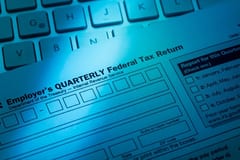Understanding who makes estimated quarterly tax payments and when
Estimated Tax Payments – Key Takeaways
- Small business owners, freelancers, and independent contractors who expect to owe at least $1,000 in taxes annually are generally required to make estimated quarterly tax payments to the IRS.
- As the name suggests, quarterly tax payments are due four times a year—typically in April, June, September, and January.
- A Block Advisors small business certified tax pro can help ensure accurate estimates and timely payments, reducing the risk of underpayment or IRS penalties.
With so much attention on Tax Day, other tax filing requirements and deadlines are easily overlooked, including quarterly estimated tax payments. Believe it or not, your income tax is a pay-as-you-go system for qualifying businesses and certain individuals. In fact, if you’re a business owner or have other types of taxable income such as capital gains, you may need to make quarterly estimated payments in order to avoid a penalty from the Internal Revenue Service (IRS).
What are quarterly taxes?
Quarterly taxes, also called estimated taxes, are how small business owners and self-employed persons pay taxes to the IRS throughout a tax year if their income exceeds a certain level. The estimated tax payment amount that they are responsible for varies from business to business.

Who must make quarterly tax payments?
Unless you are a W-2 employee and the tax taken out of your paycheck doesn’t fully cover your tax bill, individual taxpayers don’t generally need to make estimated quarterly tax payments. Estimated taxes are a different story for small business owners, however.
The Internal Revenue Service notes that, “Individuals, including sole proprietors, partners, and S corporation shareholders, generally have to make estimated tax payments if they expect to owe tax of $1,000 or more when their return is filed.” Be sure to educate yourself on the differences between an S Corp vs LLC. Corporations may also need to make estimated income tax payments if they expect to owe at least $500 for the current tax year.
The general rule is that you need to make estimated tax payments and file Form 1040-ES: Estimated Tax for Individuals if both of the following apply:
- Your estimated tax due is $1,000 or more
- The total amount of your withholding and refundable credits will be less than the smaller of:
- 90% of your current year’s tax liability
- 100% of your previous year’s tax liability
Time to pay estimated quarterly taxes?
Let a Block Advisors Tax Pro help you get on track!
Make an appointment >>
When are quarterly estimated tax payments due?
If you meet the requirements for paying business quarterly taxes, write down the following dates, as payments for the tax year are due every quarter on these dates:
- April 15
- June 15
- September 15
- January 15
If these due dates fall on a Saturday, Sunday or legal holiday, the payments are due the next business day. Learn when the corporate tax deadline may differ from these dates.
How to make quarterly tax payments
The forms you’ll use for filing and paying quarterly tax payments will vary depending on the type of small business you have.
- Individuals (self-employed persons, members of partnerships and sole proprietors) – You will use 1040-ES to submit your quarterly tax payments.
- Corporations – You will use Form 1120-W to submit quarterly tax payments for your business.
“My small business tax pro was professional and engaged and provided a plan for quarterly tax withholding.”
W. Leighton Haynes | Elevation Brand Studio, LLC
You can mail a check or send the form and your payment electronically.
Calculating and filing quarterly taxes can be a daunting task. Especially, if you’re trying to run a business. If you don’t want to tackle paying quarterly taxes alone, our Quarterly Tax Payment Service can help. When you work with your tax preparation team at Block Advisors, you can add this service for a small additional fee.
What happens if you don’t pay quarterly tax payments, but should?
If you didn’t pay enough tax throughout the year, you may incur an underpayment penalty. The penalty is a complicated formula; it’s imposed on the amount of underpayment for the number of days it remains unpaid, starting with the first quarter’s payment.
Refer to Publication 505, Tax Withholding and Estimated Tax for additional insight.
Intimidated by quarterly taxes?
A Block Advisors expert can help!
Make an appointment >>
Learn more about paying quarterly taxes
Do you have additional questions about quarterly estimated taxes or when business taxes are due? Block Advisors is here for you. You can also get help with paying estimated taxes for your small business with our Quarterly Tax Payment Service to ensure you’re paying the correct amount in quarterly taxes.
And, as always, you can choose to make an appointment at any time.
This article is for informational purposes only. The content may not constitute the most up-to-date information and should not be construed as legal advice.






